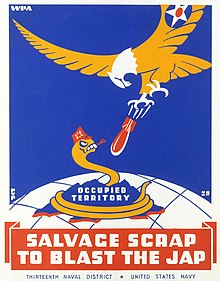Jap
In some places, it is simply a contraction of the word and does not carry negative connotations[citation needed], whereas in some other contexts it can be considered a slur.
In the United States, some Japanese Americans have come to find the term offensive because of the internment they had suffered during World War II.
However, following the bombing of Pearl Harbor and the Japanese declaration of war on the US, the term began to be used derogatorily, as anti-Japanese sentiment increased.
[1] During the war, signs using the epithet, with messages such as "No Japs Allowed", were hung in some businesses, with service denied to customers of Japanese descent.
[1] Some in the United States Marine Corps tried to combine the word Japs with apes to create a new description, Japes, for the Japanese; this neologism never became popular.
[7] Spiro Agnew was criticized in the media in 1968 for an offhand remark referring to reporter Gene Oishi as a "fat Jap".
[10] Koto Matsudaira, Japan's Permanent Representatives to the United Nations, was asked whether he disapproved of the use of the term on a television program in June 1957, and reportedly replied, "Oh, I don't care.
"[11] Matsudaira later received a letter from the Japanese American Citizens League (JACL),[12] and apologized for his earlier remarks upon being interviewed by reporters from Honolulu and San Francisco.
[14] In 2003, the Japanese deputy ambassador to the United Nations, Yoshiyuki Motomura, protested the North Korean ambassador's use of the term in retaliation for a Japanese diplomat's use of the term "North Korea" instead of the official name, "Democratic People's Republic of Korea".



